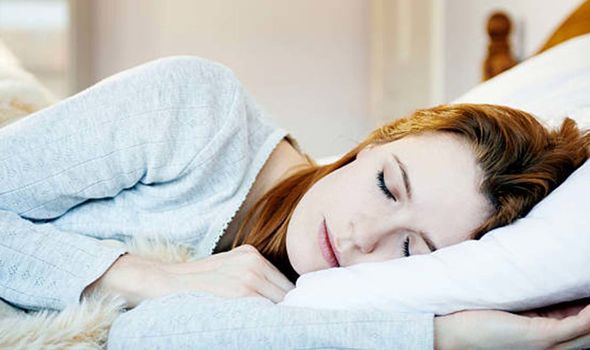
Abbey Clancy reveals that children sleep in bed with her
We use your sign-up to provide content in ways you’ve consented to and to improve our understanding of you. This may include adverts from us and 3rd parties based on our understanding. You can unsubscribe at any time. More info
Not getting enough sleep can cause an array of issues, and getting enough of it at the right times can help protect your mental health, physical health and quality of life. Some people are naturally lighter sleepers or take longer to drop off, but there are also some lifestyle factors that can impact your sleep.
The Sleep Foundation says that if you struggle to obtain the recommended seven or more hours of sleep each night, you are not alone
Though fortunately, dome food and drinks may help. The organisation says: “Drinking warm milk at night to feel tired is one such strategy that has been shared for years.”
Indeed, it says that scientific evidence suggests that warm milk before bed may help you sleep.
“In a study of people staying in a hospital’s heart unit, those who drank warm milk and honey for three days noticed improvements in sleep. A study of adults over age 60 found that drinking fermented milk over the course of three weeks reduced night-time wakings” it says.

The Foundation explains that milk’s sleep-promoting properties might be due to the amino acid tryptophan, which plays an important role in the production of serotonin and melatonin.
If you have insomnia for less than three months, it is called short-term insomnia. Insomnia that lasts three months or longer is called long-term insomnia.
For most, sleep problems tend to sort themselves out within about a month, according to the NHS.
Caffeine and alcohol can stop you falling asleep and prevent good quality sleep. Therefore, it is recommended that people cut down on alcohol and avoid caffeine close to bedtime.
Everyone needs different amounts of sleep. On average adults need seven to nine hours, while children need nine to 13 hours. Toddlers and babies need 12 to 17 hours of sleep, every day.
Electronic devices, including computers, televisions, smartphones, and tablets, all emit strong blue light.
When you use these devices, that blue light floods your brain, tricking it into thinking it’s daytime.
As a result, your brain suppresses melatonin production and works to stay awake.

People with insomnia will regularly find it hard to go to sleep, can wake up several times during the night and lie awake at night.
They might also find it difficult to concentrate during the day because they are tired, or wake up early and find they cannot go back to sleep.
“Some people are naturally lighter sleepers or take longer to drop off, while some life circumstances might make it more likely for your sleep to be interrupted, like stressful events or having a new baby,” the NHS states.
If poor sleep is affecting your daily life or causing you distress, you can talk to your GP.

The Sleep Foundation says that overeating can affect sleep, and “eating too much, especially when it involves heavy or spicy foods, can worsen sleep by interfering with digestion and raising the risk of heartburn”.
It states: “For this reason, most experts advise against eating too much and too close to bedtime.”
The organisation also suggests that meals with low fibre and high amounts of sugar and saturated fat have been correlated with interrupted sleep.
It also says that patterns of overeating can lead to weight gain, “which raises the risk of obstructive sleep apnoea” which causes “persistent sleep interruptions”.
Source: Read Full Article